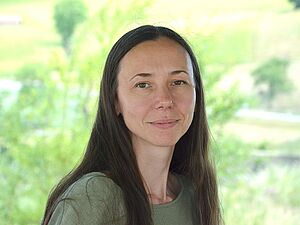"The issue is not off the table"
Voices on biodiversity
Sabine Reinecke has been working as a policy analyst at FiBL Switzerland in the Department of Food System Sciences since 2023. (Photo: FiBL, Andreas Basler)
Sabine Reinecke has been working as a policy analyst at FiBL Switzerland in the Department of Food System Sciences since 2023. She is also currently setting up a small fruit farm with orchard fruit and nuts in Baden-Württemberg with her partner. Before joining FiBL, she worked intensively on the topics of nature restoration and climate and biodiversity policy in relation to forests and integrated land use systems.
On 22 September 2024, the Swiss voted on the biodiversity initiative - and rejected it. However, this does not mean that the issue of biodiversity is off the "agricultural policy" table. The fact that the opponents of the initiative are now cheering loudly shows how "unfortunate" the process was. There was no indirect counter-proposal to pick up those for whom the initiative went too far. A good democratic process hurts everyone a little, but it was not possible in this case. Such a proposal by the Federal Council had previously been rejected by the Council of States. During the referendum campaign, the opponents ingloriously stirred up fears about the loss of 30 per cent of land for food, wood or renewable energy. However, the initiative never called for this.
However, by signing the Kunming-Montreal Agreement in 2022, Switzerland has actually committed itself internationally to the specific goal of "safeguarding" 30 per cent of all land worldwide for biodiversity. Although the partial agreement to the United Nations Convention on Biological Diversity is also about the creation of protected areas, the protection of biodiversity through appropriately adapted land use is also of great importance.
The proposed constitutional article that has now been voted on is vague and leaves a lot of room for interpretation as to what is "worthy of protection". I lack the legal "resourcefulness" of the opponents, who see it as undermining other constitutionally clearly protected goods - such as food or energy security. It is almost perplexing to ask why issues of this importance end up in a passive referendum. The "no" vote does not mean that there is a social consensus and that Switzerland is already delivering satisfactorily in terms of biodiversity. Switzerland has not yet achieved all of the goals of the existing biodiversity action plan and biodiversity remains under pressure.
Discourse with all stakeholders necessary
The broad alliance of nature and heritage conservation organisations that launched the biodiversity initiative hoped to win over many citizens by linking natural and cultural heritage. After all, nobody can seriously be against the protection of culture and nature. But in reality, it is hardly about higher goals such as "species protection", but about political sovereignty of interpretation about how, about responsibility, about costs - and who bears both.
Scientific arguments on the indisputable value of biodiversity will struggle to neutralise the enormous ideological "charge" along the lines of social conflict. Politics, on the other hand, is lived, productive conflict and its core business is the pragmatic reconciliation of interests. To achieve this, all relevant stakeholders, including those beyond environmental organisations and left-wing parties, need to be at the table, as National Councillor Jaqueline de Quattro - herself an opponent of the initiative - put it after the "no" vote. In addition to nature conservation and agriculture, everyone also means the food, water and construction industries. From an overall systemic perspective, a dialogue with owners of gravel front gardens or outdoor cats would also be necessary.
Utilising room for manoeuvre
Even after the "no" to the initiative, the Biodiversity Action Plan must be consistently implemented by all. Within the existing legal and funding framework, there is already room to manoeuvre for greater appreciation of biodiversity and those who protect it. A study by FiBL and the Swiss Ornithological Institute shows how motivating more whole-farm advice for more and higher-quality biodiversity areas can be, without any ban (link to the study and to the "Voice on Biodiversity" by Pascale Cornuz below). Target-orientated rather than measure-orientated promotion - as in the ZiBiF pilot project, in which FiBL is involved - which allows more freedom and less administrative effort, also "tastes better" to many farmers (see also "Voice on biodiversity" by Rebekka Frick).
Further information
Contact
Links
- agrarforschung.ch: Article "Mehr und qualitativ wertvollere Biodiversitätsförderflächen dank Beratung" (German and French)
- fibl.org: Voice of Pascale Cornuz
- fibl.org: Voice of Rebekka Frick




